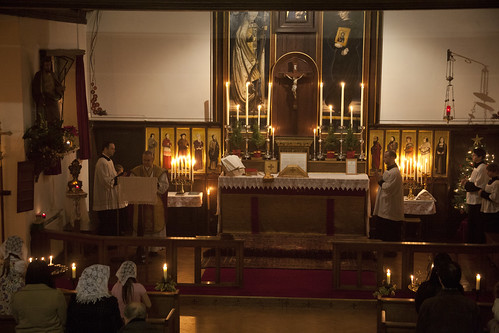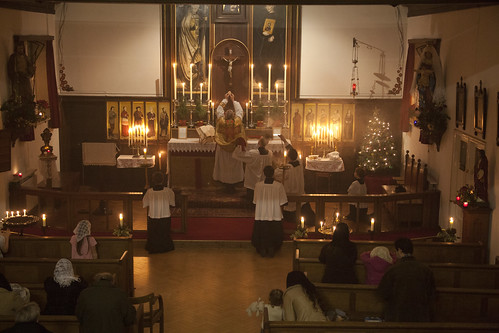 |
| The celebrant at Epiphany solemnly proclaiming the dates of the movable feasts of the year. |
It is simple, really. If it is impossibly difficult, for any reason, to get to Mass on a day of precept, you don't commit a sin if you don't go. It is not an obligation which causes anyone a real problem. On the other hand, the precept is useful not only in establishing good habits and stimulating our devotion, but in dealing with those in authority over us. Employers, school and college superiors, prison governors, and all kinds of state entities will, very naturally, take a request to make some kind of provision to allow a Catholic to attend Mass on a particular day more seriously if the Catholic says that it is a matter of religious obligation, and not just a matter of personal preference.
Sometimes employers, those organising school timetables, and the rest will find it impossibly difficult to allow Catholics to go to Church on a particular day. That's life: no one is going to hell for that reason. But when there is something which can be done to make it possible, which is, say, mildly inconvenient, they will do it if it is important for the Catholic, and not if it is not important. I'm simply assuming these individuals are reasonable human beings. How are they going to judge what it is important, and what isn't? The best thing to show them is a list of Days of Obligation issued by the officially recognised religious authorities for one's faith, in this case the Bishops of England and Wales.
It is not, however, just a matter of being reasonable. The law has something to say about this as well. In the European Convention on Human Rights, Article 9 reads as follows:
1. Everyone has the right to freedom of thought, conscience and
religion; this right includes freedom to change his religion or belief and
freedom, either alone or in community with others and in public or private, to
manifest his religion or belief, in worship, teaching, practice and observance.
2. Freedom to manifest one’s religion or beliefs shall be subject only
to such limitations as are prescribed by law and are necessary in a democratic
society in the interests of public
safety, for the protection of public order, health or morals, or for the
protection of the rights and freedoms of others.
Thus, the English Courts have ruled that Sikhs have the right to wear the ‘Kara’, a bracelet,[1] and female Muslims a Hijab,[2] at school. In the latter case the Courts ruled explicitly that the Hijab can be considered as a ‘requirement’ of the Muslim faith. By contrast, a Christian who wished to wear a cross with her uniform lost her case against her employer,[3] although this was later overturned by the European Court of Human Rights (in September 2012). The English Courts based their decision, in part, on the fact that ‘there is no mandatory requirement of the Christian Faith that a Christian should wear a Crucifix.’[4] Again, in finding against a Marriage Registrar who refused to register same sex Civil Partnerships, the Court of Appeal based its decision in part on their finding that ‘her view of marriage, ...was not a core part of her religion.’[5] Though the factual basis of these findings can be questioned, the fact remains that Courts do take into account whether any particular practice of religion is a ‘requirement’ of the religion or is merely a personal religious practice.
To summarise, in removing religious obligations from Catholics, the bishops are not making our lives as Catholics easier. Those obligations never bound to the point of making life seriously difficult. No, the bishops are making our lives harder: it makes it harder for us to live the devotional life we want to.
[1] The dispute between a Sikh schoolgirl, Sarika Singh, and Aberdare Girls’ School in South Wales: Watkins-Singh, R (on the application of) v Aberdare Girls’ High School & An or [2008] EWHC 1865(Admin) (29 July 2008)
[2] Begum v Denbigh High School [2006] UKHL 15
[3] Nadia Eweida, who was sacked by British Airways for wearing a cross on her uniform in 2006, lost her Employment Tribunal and subsequent Appeal case, where she alleged Religious Discrimination and breach of Human Rights: Eweida v British Airways Plc [2010] EWCA Civ 80 (12 February 2010). This was overturned by the European Count of Human Rights in Eweida and Others v. The United Kingdom - HEJUD [2013] ECHR 37 (15 January 2013).
[4] Chaplin v Devon & Exeter NHS Trust, ET Case No: 1702886/2009, and Eweida v British Airways [2010] EWCA Civ 80
[5] Ladele v London Borough of Islington [2009] EWCA Civ 1357

Parishes could help too: scheduling Mass on Holydays at 0930 will allow the school to come but won't allow people who are at work. When the priest is unwilling to binate, Mass at (say) 1.00 pm would still allow the schools to come, but would allow (at least some) working people to attend during their lunch break.
ReplyDeleteOn the European Convention on Human Rights (ECHR) ......
ReplyDeleteI spent hours revising this for an examination and so when I read your blog, it made me double take and cast my mind back.
The ECHR does apply to all public authorities (HM Government departments, local authorities, Education Authorities, NHS Trusts, the Police, the Prison Service, the Armed Forces) and other bodies performing public functions (such as private companies operating prisons).
These organisations must comply with the Act – when providing a service or making decisions that have an impact upon the rights of citizens.
Now, in the cases outlined on the blog, cases 1,2,4 and 5 are clear public authority cases.
Case 3 was indirect – The ECHR only came into the equation when Nadia Eweida took the matter to Strasbourg – the basis being that the UK Government had failed to protect her rights by provision of sufficient domestic legislation. It wasn’t a primary case against BA.